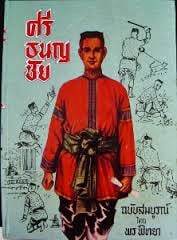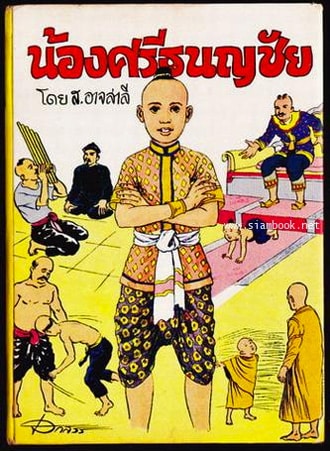Sri Thanonchai, The Asiatic Thyl Ulenspiegel

In Isan he is called Siang Miang (2), in Laos Xieng Mieng and in Northern Thailand also Chiang Miang. Around 1890 it was written down and published in print. He is still very popular, in folktales, sayings (2a), cartoons, movies (3) and of course on murals in temples (4). I think every Thai knows his name and some of his adventures.
In English he is very appropriately called a 'trickster' because that means both prankster and trickster. In Dutch we would say that he uses 'tricks' and that refers to dexterity but also to cunning.
Sri, as he is simply called in the stories, uses humor and wit to struggle through life and overcome difficulties and problems. Language jokes are his main weapon. He plays with words that are sometimes understood literally by those around him, while Sri means it figuratively or the other way around. He also plays flawlessly on the weaknesses of others, their sobriety, arrogance ('I'll do that'), greed and stupidity. He says and does unexpected things that someone else might secretly want to say and do but doesn't really dare. Sri does. Maybe he was autistic.
Sri was born into a very ordinary peasant family but he works his way up to courtier where he accompanies the king for years. in the famous epic Khun Chang Khun Phaen (5) is it the handsome Phaen who, despite his humble origins, defeats the noble, rich but ugly Chang on the battlefield of love and war. The bombastic king also clearly loses out to Phaen. We see the same thing with Sri: he is a high-ranking person and often outsmarts the king in cleverness. The audience undoubtedly sympathizes and identifies with Sri when he outshines his superiors. It is a humorous outlet for the pent-up frustrations in their lives where they always have to bow to authority. By the way, don't think that their outward humility is accompanied by a suitable inner consent or satisfaction, not even now. In general, Sri's tricks are quite harmless, but once in a while he really cheats.
I am describing two scenes from the movie mentioned below.

Four short stories
The king
One day, the king and Sri are walking through the palace garden in the cool afternoon. They are walking along the court pond when the king addresses Sri.
'Well, Sri, everyone says you are so terribly clever and that you can fool anyone and make them do what you want. Now I ask you: can you talk me into that pond?'
'No, Sire, you're exaggerating, I really can't! But I do have a good trick to get you out again'.
'Aha', says the king, 'I'm sure you won't succeed, I'm sure not, but we'll see'.
The king undresses, enters the water and looks up with a smile.
'Well, Sri, how are you going to get me out again, huh. Try it!'
'Well, Sire, I think you're right, I can't get you out of the water but I did get you in the water!'
Two full moons
One day, Aunt Sa is visited by Sri Thanonchai. He wants to borrow money. Aunt Sa has doubts because the well-dressed Sri is known as a rich man. Sri explains that he temporarily needs some more money and that he will pay it back soon.
"When you've seen two full moons, Aunt Sa, come and get the money from me." Aunt Sa is reassured and lends him the requested amount.
Two months later Aunt Sa goes to Sri and asks for the money. "But Aunt Sa, you haven't seen two full moons at all!" Aunt Sa goes home confused. Was she so mistaken in time?
A month later, she visits Sri again. "Sri, I am now quite sure that I have seen a full moon twice." 'But auntie, I didn't say you get the money back if you've seen one full moon twice, but if you've seen two full moons. Two full moons. Do you understand the difference? Well then!'
Aunt Sa drops off. On her way home she meets a monk to whom she tells the whole story. The monk knows what to do: "Come to court in the palace at the next full moon."
That day, Sri, Aunt Sa and the monk stand before the royal court. Aunt Sa first tells her story, a bit trembling. Then Sri defends himself, fully convinced that he is and will be right.
The monk is the last to speak. 'Sri, look up', he points, 'what do you see?' "I see a full moon," Sri replies.
“And now look into this pond. What do you see?' 'Another full moon,' admits Sri defeatedly.
Aunt Sa returns home happy with her money. It is said that this was the only time anyone outsmarted Sri.
A royal fart
The king had been fooled by Sri so many times that he sometimes wanted to take revenge.
He brought up a hollow bamboo tube, gave the tube a good wind and plugged it with some old leaves. He summoned three courtiers and gave them orders.
'You must take this tube to Sri Thanonchai. Tell him it is a valuable royal gift. But in reality I only farted in it," he added with a laugh. The courtiers and the king could not recover from the anticipation.
When the courtiers approached the village where Sri lived, they saw a man fishing in a canal. They asked him if he knew where Sri lived and if he was at home. 'Oh yes, I know very well', said the man who was really Sri, 'but what is your business with him?'
The courtiers couldn't resist telling him the story with a bit of boasting and a lot of chuckling. But Sri looked a little doubtful. 'Are you sure there's no gold in it? Or maybe the fart has evaporated. You'd better have a look before I take you to Sri!'
The courtiers looked at each other hesitantly but still decided it was a good idea. If it was gold then maybe they could benefit from it too… They removed the dry leaves and were then treated to the stench of the king's fart.
The golden house
Sri Thanonchai was once again late to the meeting of the royal counselors. The king was really annoyed now. "Why are you always late, Sri?" "Well, Your Majesty, I am building a house of nothing but gold, and it takes a long time!" The king's irritation turned into disbelief and a certain curiosity. "I would like to see that," said the king. The whole court went to Sri's house. When they got there, they saw a house under construction… but made of wood. The king turned to Sri: 'You said 'only gold' but this is just wood!' 'Absolutely, Sire, this house will be built of golden teak!' (7)
Nuts
1 Sri Thanonchai ศรีธนญชัย pronounce sǐe thánonchai. Sri is an honorific for names and places: 'Great, Honored'.
2 Siang is the title of a retired novice in Isaan. Mîang are fermented tea leaves, now sipped in the North and perhaps elsewhere. Sri also used a trick to trick merchants crossing the Mekong from these then quite precious leaves.
2a Chàlàat mǔuan Thánonchai 'as smart as Thanonchai': cunning, crafty.
3 The movie is called 'Sri Thanonchai 555'. Entirely in Thai but gives a certain picture of life back then.
www.youtube.com/watch?v=ya-B-ui4QMk&spfreload=10
4 In the Pathum Wanaram Rajaworawihan temple in Bangkok, view here:
ich.culture.go.th/index.php/en/ich/folk-literature/252-folk/217-the-tale-of-sri-thanonchai
5 For Khun Chang Khun Phaen see en.wikipedia.org/wiki/Khun_Chang_Khun_Phaen
The full English translation with lots of explanation and drawings is a pleasure to read: The Tale of Khun Chang Khun Phaen, translated by Chris Baker and Pasuk Phongpaichit, Silkworm Books, 2010. khun here is not 'sir or madam' but ขุน khǒen with a rising tone which was the lowest nobility, comparable to esquire.
6 The father uses the word โล่ง lôong here, which can mean both 'clean up' and 'empty'.
7 A pun on 'sàk'. 'Sàk' can mean 'only' as well as 'teak'. Thong is gold. Sri says 'sàk thong'. Sri can therefore mean 'only gold' or 'golden teak', one of the many types of teak.

